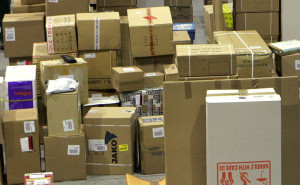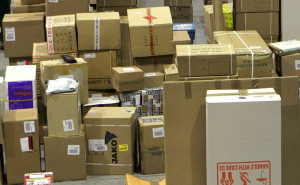Both Hermes and Yodel saw record parcel volumes over the Black Friday period.
 Hermes said retail and myHermes orders were up by 50 per cent compared to last year. Across the Black Friday Weekend, it processed a 4.8 million items – an increase of 1.2 million, or 34 per cent, on last year.
Hermes said retail and myHermes orders were up by 50 per cent compared to last year. Across the Black Friday Weekend, it processed a 4.8 million items – an increase of 1.2 million, or 34 per cent, on last year.
“Despite the massive increase in volumes this year we coped well as a result of our investment and our intensive planning programme with our retail customers,” said Carole Woodhead, Hermes CEO.
Yodel also experienced record numbers, handling 5,098,559 parcels between Thursday 26th November and Wednesday 2nd December.
Despite being Yodel’s busiest week on record, the company has said that during this period service levels were the highest on record. This year 86 per cent of online customers said they had a good delivery experience, in comparison to 73 per cent last year.
“We wanted this year’s festive peak to start smoothly and it undoubtedly has,” said Dick Stead, Yodel’s executive chairman. “Everyone’s worked incredibly hard to deliver for our clients and for the consumers who shopped online.”
November retail sales down
The record numbers at Hermes and Yodel mirror the overall UK figures for online sales. The non-food online penetration rate this year was the highest on record at 22.4 per cent – an increase of 2.1 per cent since last year.
But total retail sales in November this year only increased by 0.7 per cent on last year. On a like for like basis – retail sales for November were actually down by 0.4 per cent, according to the BRC-KPMG sales monitor.
“Detailed examination of November trading shows a slowdown in most categories as consumers held off purchases in the hopes of a deluge of Black Friday discounts,” David McCorquodale, head of retail at KPMG. “While many retailers participated, categories which saw the biggest uplift on the day were the electricals ones where, I suspect, the discounting pain was borne by supplier and retailer alike. In clothing and footwear, brands tended to hold their nerve to retain margins.”
Helen Dickinson, chief executive of the British Retail Consortium, said: “As consumers and retailers continue to adapt to the changing patterns of omni-channel shopping, where the lines between channels become less and less relevant, this build-up to Christmas is one of the hardest to read in years. The conversion of people’s higher disposable income into retail sales shouldn’t be taken for granted.”
And Joanne Denney-Finch, chief executive of the IGD, said: “”The spotlight will now fall on the grocery sector and all signs point towards a ‘multichannel Christmas’ with spending spread across a variety of formats. Supermarkets will remain the most popular destination but seven in ten shoppers say they will use discounters for some of their Christmas food shopping and a fifth will order online.”







